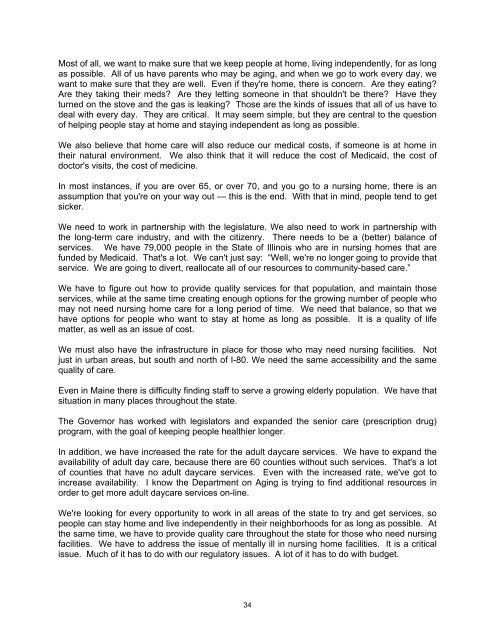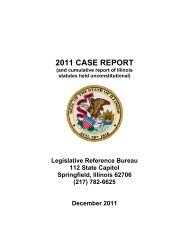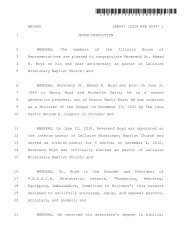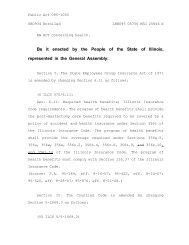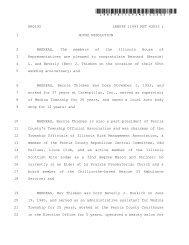Long-Term Care - Illinois General Assembly
Long-Term Care - Illinois General Assembly
Long-Term Care - Illinois General Assembly
Create successful ePaper yourself
Turn your PDF publications into a flip-book with our unique Google optimized e-Paper software.
Most of all, we want to make sure that we keep people at home, living independently, for as long<br />
as possible. All of us have parents who may be aging, and when we go to work every day, we<br />
want to make sure that they are well. Even if they're home, there is concern. Are they eating?<br />
Are they taking their meds? Are they letting someone in that shouldn't be there? Have they<br />
turned on the stove and the gas is leaking? Those are the kinds of issues that all of us have to<br />
deal with every day. They are critical. It may seem simple, but they are central to the question<br />
of helping people stay at home and staying independent as long as possible.<br />
We also believe that home care will also reduce our medical costs, if someone is at home in<br />
their natural environment. We also think that it will reduce the cost of Medicaid, the cost of<br />
doctor's visits, the cost of medicine.<br />
In most instances, if you are over 65, or over 70, and you go to a nursing home, there is an<br />
assumption that you're on your way out — this is the end. With that in mind, people tend to get<br />
sicker.<br />
We need to work in partnership with the legislature. We also need to work in partnership with<br />
the long-term care industry, and with the citizenry. There needs to be a (better) balance of<br />
services. We have 79,000 people in the State of <strong>Illinois</strong> who are in nursing homes that are<br />
funded by Medicaid. That's a lot. We can't just say: “Well, we're no longer going to provide that<br />
service. We are going to divert, reallocate all of our resources to community-based care.”<br />
We have to figure out how to provide quality services for that population, and maintain those<br />
services, while at the same time creating enough options for the growing number of people who<br />
may not need nursing home care for a long period of time. We need that balance, so that we<br />
have options for people who want to stay at home as long as possible. It is a quality of life<br />
matter, as well as an issue of cost.<br />
We must also have the infrastructure in place for those who may need nursing facilities. Not<br />
just in urban areas, but south and north of I-80. We need the same accessibility and the same<br />
quality of care.<br />
Even in Maine there is difficulty finding staff to serve a growing elderly population. We have that<br />
situation in many places throughout the state.<br />
The Governor has worked with legislators and expanded the senior care (prescription drug)<br />
program, with the goal of keeping people healthier longer.<br />
In addition, we have increased the rate for the adult daycare services. We have to expand the<br />
availability of adult day care, because there are 60 counties without such services. That's a lot<br />
of counties that have no adult daycare services. Even with the increased rate, we've got to<br />
increase availability. I know the Department on Aging is trying to find additional resources in<br />
order to get more adult daycare services on-line.<br />
We're looking for every opportunity to work in all areas of the state to try and get services, so<br />
people can stay home and live independently in their neighborhoods for as long as possible. At<br />
the same time, we have to provide quality care throughout the state for those who need nursing<br />
facilities. We have to address the issue of mentally ill in nursing home facilities. It is a critical<br />
issue. Much of it has to do with our regulatory issues. A lot of it has to do with budget.<br />
34


